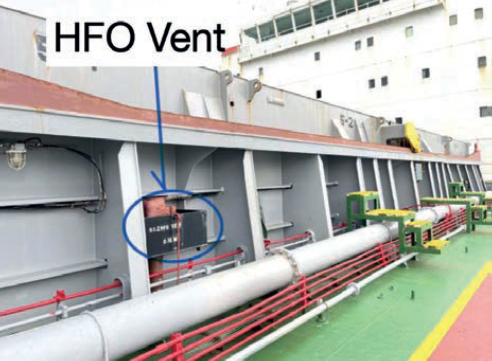202451 HFO vapours contribute to slow-motion death spiral
As edited from TIB (Singapore) report TIB/MAI/CAS.134
On a cargo vessel at sea, two crew members, a fitter and a cadet, were tasked with a welding job in a hold. As they gathered on deck near where the work was to be done, they both noticed a strong smell of heavy fuel oil (HFO) fumes from a nearby vent. While the fitter entered the hold to weld, the cadet stayed on deck to pass hoses and equipment. He was about 3.5m from the HFO vent during the time of work, which took about 15 to 20 minutes.
When they stopped for lunch, the cadet informed the fitter that he was not feeling well and would rest instead of having dinner. The next day, the cadet informed a senior officer he was not feeling well, probably due to inhaling some fumes the previous day. The officer advised the cadet to rest and advised the Master of the cadet’s condition later that afternoon.
For the next few days, the cadet was able to go to the mess room to eat but he had gastro-intestinal problems. He also complained ofa headache. The Master reportedly encouraged the cadet to eat more food to gain energy and to take fresh air. Some six days after being exposed to HFO vapours, the cadet was not recovering. The Chief Officer requested medical advice through the crewing manager, who consulted a doctor. The latter then advised to give light food to the cadet and informed the General Manager accordingly.
About 10 days after the cadet had been exposed to HFO vapours, the vessel was sailing in rough seas and several crew were seasick. Fearing that the cadet could be prone to falls in his weak state, the Master advised him not to leave his cabin and instructed another crew member to bring the cadet’s meals to his cabin. Two days later, the Master communicated with the crewing manager informing him of the cadet’s condition, which appeared to be worsening with dizziness, vomiting and diarrhoea.
It was agreed to divert to a port to allow medical attention for the cadet. Before the vessel could reach port, and some 13 days after having been exposed to HFO vapours, the cadet was found deceased in his bed. An autopsy determined the cause of death to be asphyxia due to aspiration of stomach content.

Lessons learned
-
Never be complacent about the medical care of a suffering crew member. If symptoms are prolonged or beyond the competencies of crew on board, seek radio medical advice directly from the Centro Internazionale Radio Medico (C.I.R.M.) or equivalent facilities.
-
Be aware of skewed judgement calls. In this case the Master’s sense of urgency may have been dulled by thoughts that the new cadet was suffering more from sea sickness and/or ship adaptation rather than gas poisoning.
